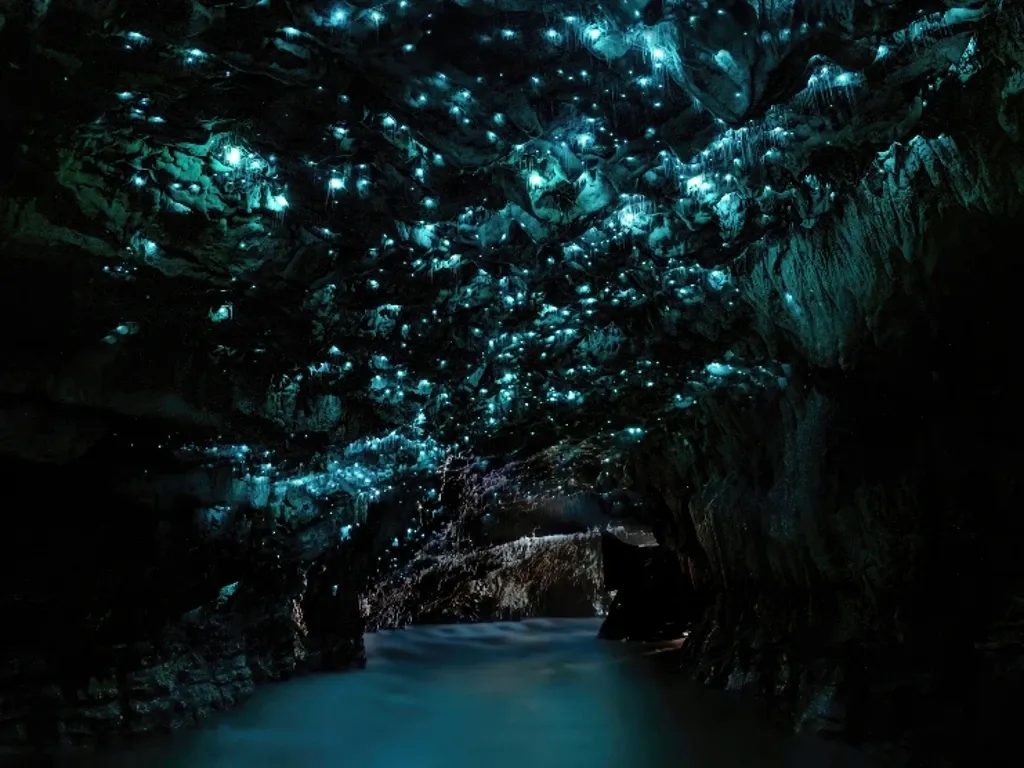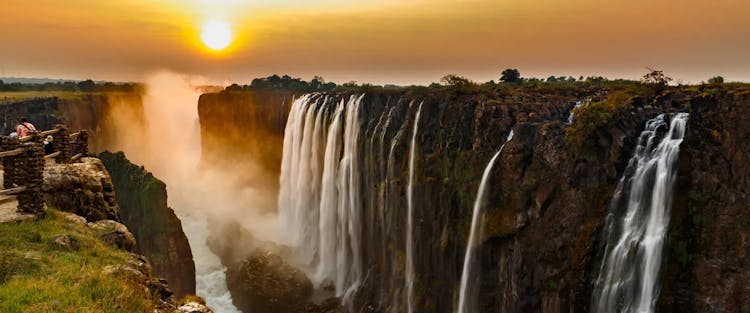
Waitomo Glowworm Caves: New Zealand’s Bioluminescent Caves Only Accessible by Boat
New Zealand is a traveler’s paradise, perhaps best known for its diverse natural beauty, from rainforests and hot springs to glaciated peaks made famous by Lord of the Rings. But one of the island nation’s most unique attractions is hard to spot, hidden in a labyrinth of caverns beneath unassuming farmland less than three hours south of Auckland. Near the village of Waitomo, visitors can float through caves by boat, illuminated only by a constellation of natural light: glowworms.
In New Zealand, glowworms aren’t actually worms at all. Rather, the star of the show is a predatory gnat with a special talent called bioluminescence. Native only to New Zealand, the Arachnocampa luminosa gnat produces a specialized enzyme called luciferase that creates a chemical reaction within the body, allowing them to emit a blue-green light. It’s a similar chemical reaction as European glowworms and American fireflies (which are both beetles, not worms), but the enzyme found in New Zealand’s glowworm is unique. Though the glowworm is bioluminescent in most phases of its life—from its early larval form to adulthood—it’s the wormlike larval stage that produces the most impressive display. In order to snare prey, the larvae create nests and hanging lines of silk and mucous, and the ghostly light that shines from their hind ends illuminates these sticky traps.

New Zealand’s glowworms are found in cool, damp environments across the North Island, but the Waitomo Caves have a show like no other. Here, glowworms number in the thousands, and the lines of silk hanging from the roof of the cave are even more numerous.
Waitomo’s natural light show was reportedly first explored by Maori chief Tane Tinorau in 1887. He fully navigated the cave’s waterways, accompanied by Fred Mace, a British surveyor, on a hand-woven raft using candles to guide the way. Later, he discovered an above-ground entrance that made for easier access. Within two years, locals were leading spellbound tourists into the cave. Ever since, cave tours have served as a valuable economic resource in the local community, and many of the tour guides now working at Waitomo Caves are descendants of Tane Tinorau.
Today, travelers can explore the cave in much the same way as it was first discovered. First, you’ll tour the dry, upper levels on foot, eventually reaching the largest room, known as the Cathedral. Formed over 30 million years ago by wind and water eroding the soft limestone, these rooms feature delicate formations like pillars, stalactites, and stalagmites. Then, you’ll descend to the lower levels of the cave system where the ambiance takes a marked turn—subterranean, silent, and accessible only by boat. Take a seat and turn your attention upwards, where thousands of glowworms and their webs—which collect moisture and refract light—will illuminate your way. It’s an otherworldly sight, best observed in silence (talking is discouraged) and in darkness (no cameras or lights allowed).
At 45 minutes, the tour is not lengthy but still feels like a voyage to another world. For adventurous travelers, there are lengthier—and wetter—tours on offer that include rappelling into the cave system, jumping off a few waterfalls, and tubing through the subterranean waterways. These longer tours average 3-5 hours, easily occupying an entire afternoon.

Getting there
- The nearest international airport is Auckland Airport (AKL), located 111 miles from Waitomo Caves. For travelers already in the country, a local flight to Hamilton Airport (HLZ) gets you closer—40 miles away. By car, the caves are located between the villages of Te Kuiti and Otorohanga along State Highway 3. From the highway, drive approximately five miles (east from Otorohanga, west from Te Kuiti) along Waitomo Caves Rd (Hwy 37) to the visitor’s center. Bus tours from Auckland are also available from InterCity, as well as several private coach lines.
- Average Going price for cheap flights to Auckland: $816 roundtrip
How to do it
- Best time to go: The caves are open year round, but weather in the surrounding countryside will be most pleasant around the summer months (December-March). If possible, avoid the busiest season, which aligns with public school holidays from December 20-January 30.
- Cost: Tickets are required and should be booked ahead of time, especially during peak season. An adult ticket costs about $40, a child ticket is about $18, and a family pass (two adults and two children) is about $93.
- Safety considerations: The walkway to the boats in Waitomo Cave can be damp and slippery. It is also not wheelchair accessible, though the walking tour through nearby Ruakuri Cave is, thanks to the spiral walkway that descends into the cave.
- Tips: The caves hover between 54-57°F year round, so be prepared with warm layers, even in the summer. The consistently cool temperatures also allow the caves to operate year round, making the attraction a worthy visit no matter the season. The only exception is in cases of heavy rain, which can raise the water level in the cave to the point where they are impassable. Though rain is slightly more common in the winter (June-September), rain closures are possible in any season. The area is host to numerous other natural attractions, including the Ruakuri Walk (a short walk away), Marokopa Falls (a 35-minute drive), and Kawhia Hot Water Beach (about a 1.5-hour drive).
More destinations in Australia, New Zealand, and the South Pacific
More natural wonders around the world
Published October 10, 2023
Last updated December 19, 2023
Articles you might like
View AllTreat your travel to cheap flights
Most deals are 40-90% off normal prices with great itineraries from the best airlines. If it's not an amazing deal, we won't send it. Sign up for free to start getting flight alerts.




